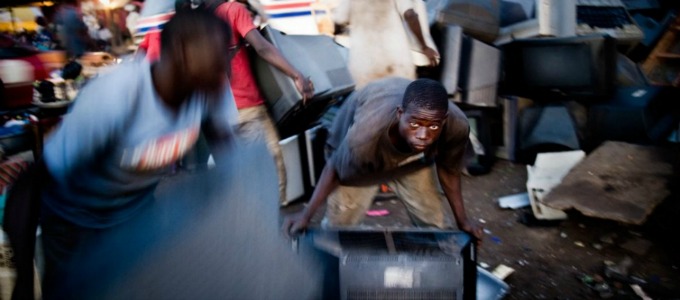From UNEP
By 2050, a whopping 1.33 billion people will inhabit African cities – almost 900 million more than today. Africa’s pace of urbanization is the fastest in the world, which means that, in 20 years, half of the continent’s population will be city dwellers.
And with great numbers of people comes an enormous amount of trash. Lower income cities in Africa and Asia are expected to double their municipal solid waste generation within the next 15 to 20 years, placing a major strain on the continent’s poor infrastructure.
A seemingly daunting challenge and an acute health risk, the growing heaps of trash can actually provide a sustainable development opportunity, which African countries are increasingly embracing.
In May this year, countries will meet in Nairobi for UNEA 2 – the world’s de facto “Parliament for the Environment” – to discuss how safeguarding our environment can benefit human health, societies and economies. Adopting sustainable waste management practices is not only vital to protecting human health, but can also bring multiple social and economic benefits, advancing the 2030 Agenda for Sustainable Development.
Recognizing these opportunities, six major universities from five African countries – Kenya, Egypt, Mauritius, Burkina Faso and Ethiopia – established the region’s first University Consortium on Waste Management this year.
The UN Environment Programme (UNEP) talked to Professor David Mungai, a member of the consortium representing the University of Nairobi in Kenya, about the role of the consortium in strengthening the ability of African countries to create appropriate solutions for solid waste management.
“The overall purpose of the Consortium is to build capacities of African countries to better manage solid waste, particularly in cities,” explained Professor Mungai.
The Consortium will focus on training countries on various aspects of solid waste management, including the understanding of solid waste generation patterns in African societies.
“It will also look at best available technologies of dealing with solid waste management and governance, African institutions’ capacity and how can they be more responsive to appropriate and efficient solid waste management services, creating awareness, creating partnerships so that the issue of waste management is given a holistic approach,” added Professor Mungai.
Solid waste management activities – such as garbage collection and segregation, and retrieving recyclable materials – are a major source of income for the poorest, most vulnerable groups. Globally, there are 15 to 20 million people working in the small-scale informal waste sector, often in precarious conditions, exposed to hazardous substances and with no access to health and safety precautions.
These people mine the mountains of waste for plastic bags, containers, knives, spoons, frying pans and electronic devices, which can be reused or recycled.
“We would like to look at solid waste as a resource. Quite often, we have dealt with solid waste as something that has to be taken to the dumpsite or to landfills, or at the very worst, left in the environment. We would like to promote the conversion of solid waste into useful materials, energy recovery for instance and recycling of certain materials. This can be very important for Africa because it has the potential to create jobs particularly among the young people and women in our African societies,” pointed out Professor Mungai.
In some cases, waste recycling could yield a monthly income of between $130 and $800 per person per month. In a region where over 40 per cent of people still live on less than $2 a day, that is a significant amount.
The Consortium will also play a critical role in bridging the gap between science and policy. It will support African policymakers to develop evidence-based policies on waste management and governance.
“We are talking about policymakers in national governments. Involving them in the research we do to address real problems that are faced in different parts of each of the member countries of the consortium will help provide appropriate solutions to the African situation. There should be no gap between research and policy to tackle the issue of waste management,” said Professor Mungai.
The scale of investment needed for the proper implementation of the environmentally-sound management of solid waste is beyond the capacity of African countries. Therefore, support from the international community is required. The support should focus on technology transfer, private sector investment and building the capacity of local institutions.
South- South Cooperation and global partnerships could benefit African countries and help them overcome the management of solid waste.
Professor Mungai said that when it comes to waste management there is a lot to learn from the North because of their long history of innovation. There is no need to reinvent the wheel, he said.
“Whatever we get from another environment, we have to make sure that it is customized to the local African environment. Through the Consortium, we intend first to strengthen the intra- Africa partnership. It makes a lot of sense for us to strengthen partnership between ourselves and reach out to our African partners. We also work with Asian universities and we would also want to reach out to the international research organizations for best practices,” he added.
The African University consortium on waste management will play a pivotal role in bridging science and policy, and in helping African societies develop local know-how to manage solid waste sustainably. It will also help to address the gap between waste management policy and legislation and actual waste management practices in Africa, which is currently widening due to perennial capacity constraints and lack of waste management facilities.
Source: http://goo.gl/mU4ktN


